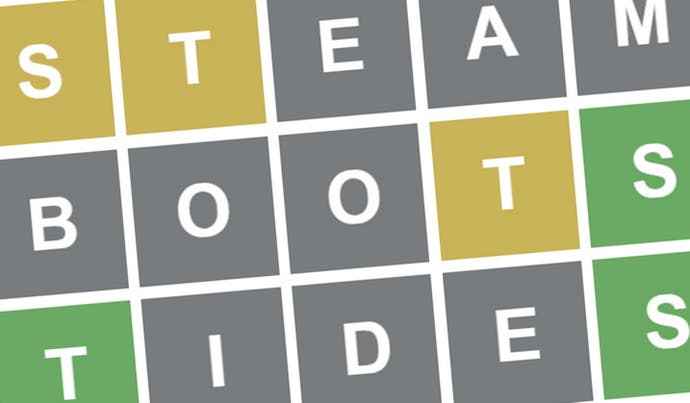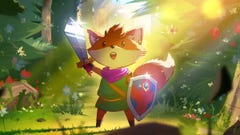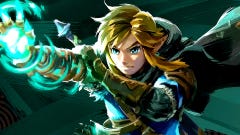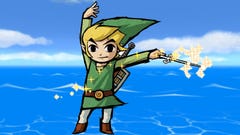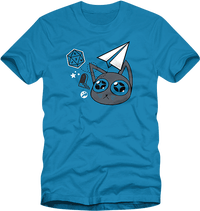A world beyond Wordle: how games became a big deal at the New York Times
Fagliano!!!
It's strange to think that for a moment in 2022, the New York Times, one of the most prestigious and respected news brands on the planet, became a global media story itself - for buying a game. Wordle wasn't just any game though. Created by programmer Josh Wardle to amuse his partner, it was - and still is - a phenomenon; a deceptively simple word-spotting puzzle with an insanely compelling and sharable design. Launched in October 2021 it became a viral sensation, hitting two million players by December, and three million by the time the NYT purchased it at the end of January 2022.
Wordle now sits on the NYT's renowned online games portal among the paper's homegrown titles, including the thoughtful word search challenge, Spelling Bee, the dot-to-dot shape-maker, Vertex, and the ever compulsive Mini Crossword. The games were played almost four billion times in 2022, attracting over one million subscribers, and it's such an important part of the paper's remit, the service now has its own "Play" tab in the NYT News app.
Heading up Games for the paper is Jonathan Knight, a 25-year video game industry veteran who started out as a producer at Activision before moving to Electronic Arts, Warner Bros and Zynga. So what's the secret of the NYT's puzzling success, and what's it like running a game studio inside a digital news operation? We sat down with him in London to find out.
So your background is in the traditional video game industry. What was it like making the move to the New York Times?
Jonathan Knight: I've played board games and puzzle games all my life, and really like word games, I like games with a bit of mental challenge. When I went to Zynga I was general manager on the Facebook games before pivoting into mobile, and I was there for 10 years, particularly working on casual games. I ran the Words With Friends business for a little while, I worked on Farmville. So it's been a gradual transition, it wasn't a shock. It felt right - although at the same time this is a very different kind of company. I was really excited when the NYT reached out - I love having meaning to this work. The mission of the company is to seek the truth, to help people understand the world, working to save democracy. It's very rewarding to be at a company that is mission-driven. We've worked hard to build what we think now is a world-class gaming service, where you can play the games across multiple platforms, and there's a unified backend. There were a lot of technical things we needed to do to bring us closer to the traditional games industry in that respect and I think we're still on that path.

Can you tell us a little about how the Games section works. How many staff do you have, and does it function at all like a traditional game studio?
Jonathan Knight: We don't give out team sizes, specifically, but it's a good size operation and in many ways it is like a games studio: we have engineers and product designers, we have data analytics support and I have a group of producers keeping us all on track. I think one thing that's a little bit different from traditional games studios is our focus on editorial: what makes us unique is that our puzzles are human crafted, curated and edited with quite a strong editorial vision and that's part of being at the NYT, we take it very seriously. What are the crossword clues? What are the answers? What is the Wordle word of the day? There are human beings trained to do this who are touching those puzzles every day.
So, every element in each puzzle is handcrafted - there's no automation? Can you tell us how else that editorial approach affects the games?
Jonathan Knight: With the crossword, we have established a tradition of symmetry within the grid - all NYT crosswords are symmetrical both horizontally and vertically. That establishes the feel. From there we think about difficulty - we want Mondays to be quite approachable and solvable for pretty much everyone, and then they get more challenging throughout the week. We have a beginner crossword challenge as part of our gameplay column, which has forums, tips, tricks, articles, that's a sort of sibling to our games product itself - we think a lot about how to help people become better solvers.
From there you get into the [details] of clueing and there's a lot of art and a lot of science to how that works. On something like Spelling Bee, we have an editor, Sam Ezersky, who curates that everyday and he has a specific lens - he wants to make sure that all the possible words are recognisable and that you're not held back because you don't know some completely obscure word - but he also wants to make sure he's not banning obscure words that are legitimate. Every week there's a furore over some word that he banned that should have been allowed. There's a balance there between challenge and fun, and we want you to feel great when you solve the puzzle.
4d10.jpg?width=690&quality=75&format=jpg&auto=webp)
How do you see the puzzle section intersecting with the rest of the newspaper content?
Jonathan Knight: It's interesting. It's a long tradition. The first crossword puzzle ran in the NYT in 1942, and obviously it was during a tough news cycle. The decision to run the puzzle during the war was controversial - there's a famous memo [about it] hanging on the wall at the Times building. The decision at the time, which I think is the same today, is that games should be part of the offering but ultimately a diversion from the news: come for the news, stay for the games. It creates a more rounded experience. So we tend to operate independently from the news and in some ways we're deliberately not trying to be newsy.
At the same time, there is a connection in terms of the standards of editorial rigour - making sure our clues and answers are relevant obviously - there's a high degree of focus on accuracy, and increasingly we want to modernise the operation so that the crossword clues and answers and the Wordles and Spelling Bees are relevant and inclusive, that the constructor community is better represented. We have a crossword constructor fellowship that focuses on crossword constructors from traditionally under represented groups - women, people of colour, the LGBT community - we select applicants and pair them with mentors to help get their crossword puzzles to NYT standard and ultimately to publish them. The first class was last year and all five puzzles got published. We have a new class this year with six fellows and we're excited about that. So there's a whole effort underway to continue the tradition of the highest standard of quality. In short, yes we're connected to the newsroom in terms of standards and integrity but also independent in that our games should be fun.
Do you have to keep the global reach of the digital NYT in mind when writing puzzles?
Jonathan Knight: Yes, indeed we do. With Wordle we take care not to choose words that have obvious alternate spellings in UK English - so, for example, we avoid words like "color". We have a big following in the UK and that's important to us. [Crossword editor] Will Shortz will be the first to say that for a long time there were a lot of references to 1930s New York Yankees baseball players in the crossword puzzle, and at some point you have to acknowledge that this is not necessarily appealing to a broad international audience. It's tough, though, because crosswords also have what we call crosswordese - certain four letter words with lots of vowels that are useful on a crossword grid. You can't just come up with whatever you want and assume it's all going to work together. "Oreo" is very commonly used: it has three of the five vowels so it's super useful for creating a healthy grid, but how we clue that word has changed over the decades.
It's interesting that you had experience at Zynga, which was making what we called at the time "appointment games" - in that they fitted into people's daily routines. That's what the NYT games do, too. Does that affect how you design them?
4d10.jpg?width=690&quality=75&format=jpg&auto=webp)
Jonathan Knight: We talk about that all the time. Our motto is "thoughtfully made and thoughtfully played", and we have five filters under that which dictate how an NYT puzzle is made. One of those is "time well spent", and that's really important. We provide human-made puzzles and when you solve them, then that's it for the day, and when you come back the next day, there's a new puzzle. Every puzzle has the date on it, it's today's puzzle. In the case of the crossword, you can go back and play 30 years of the archive, same with the Mini Crossword; this year we're going to be introducing the ability to go back and play past Spelling Bees which is a highly requested feature.
That idea of a daily puzzle really came out in Wordle and it was why it was such a natural fit for the NYT. Josh Wardle solved the Mini Crossword everyday, and his partner played Spelling Bee, so his idea was, it's one word and once you solve it, that's it. Other game studios might have been tempted to let you keep finding new words all day long, but that's not our goal - we're not trying to get 24/7 engagement out of you. We think it should be time well spent. People do the Wordle in the morning then put it down and come back the next day - we kinda like that cadence. That said, we have a variety of puzzles. The Mini can be done quite quickly and we have a leaderboard on how fast you completed it, so in some ways we're encouraging you to spend even less time on it! But we think of Spelling Bee as a multi-session game: you might come back to it several times through the day to see if you can find a few more words. It doesn't have a definitive ending. And again a crossword puzzle, depending on whether it's a Monday or Saturday or whatever, could take you a little longer. So we think we have a good variety for different audiences with different needs and maybe at different stages in their lives. But it's time well spent - that's the goal.
A lot of players develop almost a para-social relationship with your puzzle makers - people often try to guess Josh Wardle's mood from the words he uses - the same with Joel Fagliano's clues in the Mini Crossword. Is that something you're aware of? That human connection?
Jonathan Knight: Yeah, you're absolutely right. The way we think about it is, these puzzles are in a way multiplayer in that it's the solver and the constructor almost engaged in a two-player game. So absolutely, you're playing against Joel when you solve the Mini. That goes way back: Will Shortz always wanted the NYT crossword to be clever, with tricks and wordplay so you had to guess what the constructor was up to.
Are games becoming more important to newspapers in the digital era?
Jonathan Knight: Yeah, puzzles are a really important part of NYT strategy. The overall company strategy is to be the essential subscription for curious people looking to engage with and understand the world. That mandate is broader than just the news now. I like to remind people that, in the old days when you got the Sunday paper, it wasn't just the news, it was show times, it was recipes, sports and puzzles, maybe fashion and lifestyle too. That was the full package of the Sunday paper.
I think when we transitioned to a digital news subscription, it was at the time an existential crisis - it was for a lot of newspapers - and we made a big bet on digital subs, that people would pay for quality journalism, and that's working. But I think in doing that, we maybe focused too much on just the news product, and we're now realising we need to get back to that full lifestyle offering. It's not just the news, it's your passions and how we can help you engage with those passions and with other people who share them. I think more tactically in terms of the business, what we're seeing is that subscribers who engage with two or more of our products - for example news plus games - retain way better over the long term. We're not expecting any subscriber to engage with every single one of our products every week, and with games it's the same thing - we don't expect everyone to solve all of our puzzles. But if they engage with two or more, they're much more likely to retain. That's the engagement strategy that's helping grow our subscription business.
Are you constantly developing new prototypes for games? Or is your concentration on supporting your current games?
Jonathan Knight: I think my answer to that is probably similar to a lot of games studios operating in the mobile and free-to-play space, or in console live service games: you always have that healthy tension between supporting existing games where the users are, which is the core business, versus how much should you put into the development of new games. That dynamic is definitely at play for us. Yes, we have a team dedicated to prototyping and we're going to be testing two new puzzle games this year at a minimum - TBD on what those are, but it's a big part of what we're doing. We think that new dynamic, clever, unique puzzles in the NYT style is essential to our future and our growth strategy. At the same time we have a huge audience on Wordle that we're supporting, finding value, funnelling them into our other games. We're investing in Spelling Bee this year, we want to make sure we maintain our leadership on the crossword, so I'd say most of what we do is supporting our existing games.
What did you as a team learn from the success of Wordle?
Jonathan Knight: I mean Wordle was just pure genius. What it taught us was that a game doesn't have to have complicated multiplayer functionality built into it to be a social game. Wordle leverages WhatsApp and uses it as its channel for multiplayer functionality, right? That's been fascinating, especially coming from Zynga where we were building really complicated matchmaking functionality, head-to-head asynchronous gameplay with push notifications, hosting of multiplayer games with chat systems built into the app - all that is pretty daunting and expensive for developers to build.
Then along comes this game that's a fairly short bit of Javascript code and then the social game plays out in your WhatsApp thread - that's been incredible. And the reason that worked was the genius sharing mechanic - when you solve it you can share out this little grid of yellow and green squares and it's a little story of how YOU solved the puzzle of the day, but it doesn't spoil it for those who you share it with - it might give them a little bit of a leg up if they really study it, but it's just a way of saying this was my journey. It's user-generated content, basically, because almost no two grids are alike, especially on any given day in any given friend group. It just kind of reminds your friends to play and gives you a little something to talk about, even if that's just sharing an emoji.
And what we've found is, even when people get X out of 6, it's super frustrating but that's even more of a sharable moment - it's less about bragging. I mean, if you have a group on the Mini, you're probably competing for the fastest score and bragging a bit, but with Wordle it's much more collaborative and friendly: both success and failure are shareable experiences.
And you have some real super fans don't you?
Jonathan Knight: Actor Natasha Lyonne (Poker Face, Russian Doll), is a huge fan of Wordle; J. Smith-Cameron (Succession) plays Spelling Bee - she tweets at Sam, they have a back and forth on Twitter. Jimmy Fallon, Megan Markle and Kamala Harris have spoken about Wordle. Bill Gates wrote an entire blog post on his Wordle experience, the words he chooses and why he chooses them. It was a very scientific breakdown of his Wordle habit! We actually have a dedicated Slack channel for any time a celebrity tweets or writes about their experience with our games. We jump on there and share it out!
For me, the ultimate wordle moment was turning on CNN and watching Anderson Cooper interview Monica Lewinsky about Wordle for about five straight minutes - I was like, what is happening here?
Do you pay attention to the different crossword culture in the UK and elsewhere?
Jonathan Knight: We're very focused on the US when it comes to our crossword. I try to solve British crosswords and I just can't get very far because of the cultural references, even if it's just the name of a town or a football team - I struggle. But I have a lot of respect for the cultural specificity from region to region. My wife is French, and her mother and grandmother solve crossword puzzles every day, they're religious about it, they buy the books - it's a big part of their culture to solve them on paper. Their crosswords are quite different too. In fact crosswords are different throughout Europe, it's been quite interesting to see that. We're doing well in the UK, but obviously Wordle and Spelling Bee are easier to make global. Just don't put the word "color" in there.
So what's the future of puzzles in newspapers? Is AI going to be involved?!
Jonathan Knight: We have a gameplay newsletter that we put out every day and one of our editors Joel Faglioni, who does the Mini, he recently did a piece about ChatGPT: he sat down and asked the bot to construct a crossword puzzle and then he detailed out his experience, at the end of which he concluded that he has nothing to worry about any time soon. I did that myself. The day ChatGPT came out, I secretly went off and spent a couple of hours trying to get it to construct a crossword puzzle, just to make sure I knew where we stood! And it really struggled. So no, I don't think that's coming any time soon.
With AIs like ChatGPT, I don't think we should think about them as replacing humans, we should think about them as very effective assistants at lots of different things. With puzzle generation in general, the tools have evolved a lot over the past few years and I think they will continue to evolve, especially if you want to increase the breadth and amount of content you're putting out. I think there are going to be a lot of technological tools and relational databases that will help constructors get a leg up so they can spend more of their time on the fine tuning, the polish, the clever twists and wordplay.
I think in terms of broader trends for papers, I don't want to sound arrogant, but more papers will be following in our footsteps in terms of using games as a way to engage their news readers and subscribers, because they create a more well-rounded experience. The news cycle can be kind of bumpy, but games are a daily habit, so they're a great way to even out that engagement. Increasingly, we're going to see the continued decline of print and the continued rise of even older audiences fully consuming news digitally and that's going to put a lot of pressure on newspapers to have high quality digital solutions to a variety of puzzles, because people are going to want to play on their laptop, their desktop, their tablet, their phone, they're going to expect their progress and who they are to be saved; they're going to expect you to remember their achievements over time. All of that requires investments which for traditional gaming are just an ante, just table stakes, but for these media and newspaper companies, that's new. There will be a race to transition from a provider of puzzles to a gaming service.
Going forward, games are fundamentally social and I'm definitely interested in finding ways to capture that experience of sitting around the kitchen table shouting, "what's a five letter word for a European capital beginning with P?". I think Wordle has accelerated the idea that we can bring those collaborative puzzle-solving experiences to digital. That's what we see and that's what we're focused on.
